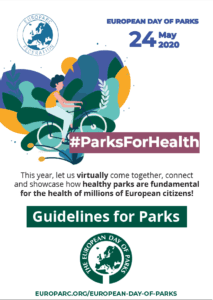Webinar [in Spanish] Creando Alianzas con la Carta Europea de Turismo Sostenible
Creando alianzas en Territorios Natura 2000 con la Carta Europea de Turismo Sostenible
- Martes, 28 Abril 2020
- 13:00 CET
- participación es gratuita pero es necesário registrarse. Regístrese aquí: https://webinariocreandoalianzascets.gr8.com/
La gestión eficaz de los espacios naturales protegidos y los sitios Natura 2000 requieren de la participación activa de la comunidad local. Esto incluye no sólo a las autoridades de gestión, sino también a las ONG, las empresas y la población local en general. La creación de alianzas a nivel local y la garantía de apoyo mutuo es una prioridad fundamental para el éxito de cualquier proyecto de conservación.
Por consiguiente, ¿cómo pueden las áreas protegidas hacer participar a los interesados locales y qué estrategias y técnicas pueden utilizarse?
En este seminario web escucharemos cómo la Carta Europea de Turismo Sostenible (CETS) puede impulsar la cooperación y la participación a nivel local.
Javier Gómez-Limón, de la Oficina técnica de EUROPARC España, presentará la metodología CETS y dará una visión general de su aplicación en las áreas protegidas españolas. Por su parte, Cati Carrillo Sánchez, de la Región de Murcia, compartirá con nosotros su experiencia de primera mano en la aplicación de la Metodología de la Carta en el Parque Regional Sierra Espuña. Cati compartirá las herramientas y técnicas utilizadas para dirigir las sesiones participativas y aumentar el compromiso.
Ponentes invitados
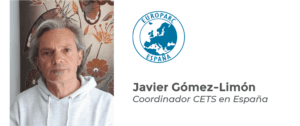
Javier Gómez-Limón García es doctor en Ciencias Biológicas por la Universidad Autónoma de Madrid (1996). Ha dirigido diversos proyectos técnicos y de investigación sobre planificación, uso público y turismo en espacios naturales protegidos. En la actualidad desarrolla su principal labor profesional en EUROPARC-España, donde es responsable del área de uso público y turismo sostenible en espacios naturales protegidos y, coordinador del proyecto de la Carta Europea de Turismo Sostenible (CETS).
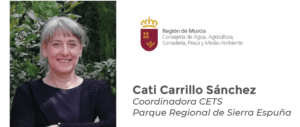
Esta será una experiencia interactiva, por lo que podrá conectarse con su cámara y su micrófono y compartir su experiencia y sus preguntas en el debate final. La participación en el seminario web es gratuita, pero es necesario registrarse. Por favor, regístrese aquí: https://webinariocreandoalianzascets.gr8.com/
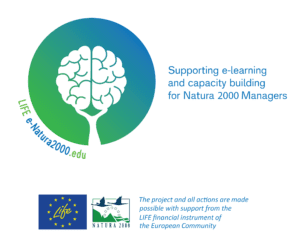
Este webinar es una actividad del proyecto Life e-Natura2000.edu, un proyecto de capacitación para gestores de Natura 2000, liderado en España por FUNGOBE y EUROPARC España, y coordinado por la Federación EUROPARC.
European Day of Parks goes online #ParksForHealth
The European Day of Parks is a commemorative day for Protected Areas across Europe that was launched in 1999 by the EUROPARC Federation to celebrate Protected Areas throughout Europe. It celebrates the creation of the 1st National Parks in Europe – a set of nine parks created in Sweden in 1909.
2020: Special Online Edition #ParksForHealth
When the EUROPARC Federation decided last year that ‘Healthy Parks, Healthy People’ would be the theme for the European Day of Parks in 2020, we would have never thought it would be this relevant. What we did know however, is that positive contact with nature is important for human health. It can create well-being, prevent public health problems and promote an active lifestyle.
Parks & protected areas have an important mission connecting people with nature! Parks not only protect our valuable natural resources – they deliver positive health outcomes. Contact with nature is essential for human health, and in an ever-more urbanised Europe, we must create more opportunities for citizens to connect and explore the outdoors… Positive contact with nature is proved to create well-being and promote active lifestyles!
In 2020, the European Days of Parks will highlight the connection of nature and human health… Healthy People need Healthy Parks! Due to the special situation Europeans are currently living in, the European Day of Parks goes ONLINE! Organising events on site will prove difficult this year, however, we can still excite, inform and remind people of the value of their parks in a digital format. For this occasion we created the hashtag #ParksForHealth.
Click on the image to open our guidelines for parks.
Join us!
Let us showcase how important our natural heritage is for our health AND the health of our planet. Using the hashtag #ParksForHealth, get the word out through your social media channels and your park’s homepage on how essential healthy parks are. Use the social media platforms you have – Facebook, Instagram, Twitter, Youtube – and add #ParksForhealth in all your posts. Start today! The EUROPARC Federation will make a compilation of all posts with #ParksForHealth to send a message to the world on the 24th of May. Download the Guidelines for Parks to give you inspiration for your posts and activities.
You might organise activities such as
- online nature walks & guided tours
- sports activities (like an online yoga class)
- online education activities for children (involving the local schools!)
- online conferences & workshops
But remember: this year health must be at the heart of your events!
Of course, we must urge people to stay at home for the time being! However, Europe’s parks are still “working” for our communities, generating fresh air, clean water, a refuge for nature, and they will be there for people again to recover and restore after the confinement. This European Day of Parks we need more than ever to show the real value of our parks across Europe, for people and for nature!
The EUROPARC Federation will create a video with footage, sounds and pictures from all parks throughout Europe, highlighting Europe’s amazing natural heritage. For this we need your help!
Send us footage from your park, from birdcalls to wildlife pictures and videos that showcase just how special these places are. We will create a ‘tour through Europe’ and release it on the 24th of May. Send your footage with the park name and credit info to communications@europarc.org
Next webinar: Capacity Building for Marine Conservationists
Protecting our Marine Environment: specific capacities for special places!
- Monday, 20th April 2020
- 15:00 CET
- participation is free but registration is needed. Register here.
Protecting our seas and marine ecosystems is of utmost importance. On the EU level, there is a pressure for member states to increase their marine protected areas, to clean up coasts and safeguard species. The fragile balance of our marine ecosystems is threatened due to human activities, like fishing and tourism. Hence, any marine strategy needs to be people-based. And for that, our marine technicians need proper training and skills.
After learning in the last webinar how LIFE INTEMARES is engaging stakeholders at a local and national level, in this webinar, we will follow the topic of Marine protection. But this time focusing on needed skills and competencies.
Patricia Marti Puig (ES) will present two case studies about her capacity building work in marine conservation in the Atlantic Ocean and Mediterranean Sea. She will focus on the specific training needs of marine conservationists and, in particular, the competencies required for successful and inclusive stakeholder engagement approaches in the marine environment. The webinar will include an interactive question and answer round.
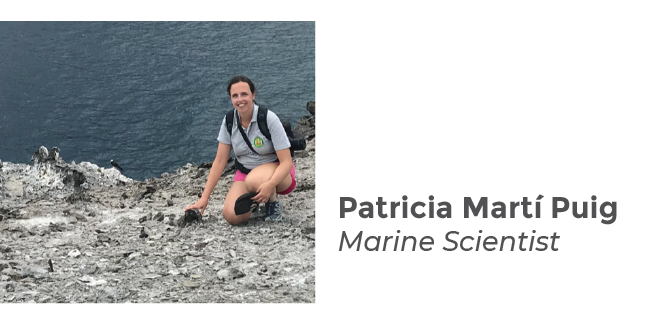
Patricia is a marine scientist with international experience in different fields including biodiversity and monitoring, conservation and restoration of marine biodiversity and in the science-policy-society interface. Born in Alicante, on the Mediterranean coast, Patricia is passionate about the conservation of marine biodiversity. With 14 years of international research and professional experience, she has directed and supported marine conservation projects in governments, NGOs, the private sector, and academia in the Mediterranean Sea, Atlantic, Pacific, Caribbean, Indian ocean and Red Sea. She has contributed in research, monitoring and management in several MPAs in the Mediterranean and overseas: Cabo de Palos, Port-cros, Portofino, Tavolara, Galapagos Marine Reserve and Ascension Island MPA. Her stated aim is to build the next generation of MPA managers, trained in transferable skills such as governance, management, stakeholder engagement, conflict management and socio-economic aspects of MPAs.
This webinar is an initiative of the Life e-Natura2000 blended course “Competent Inclusive Communications”.
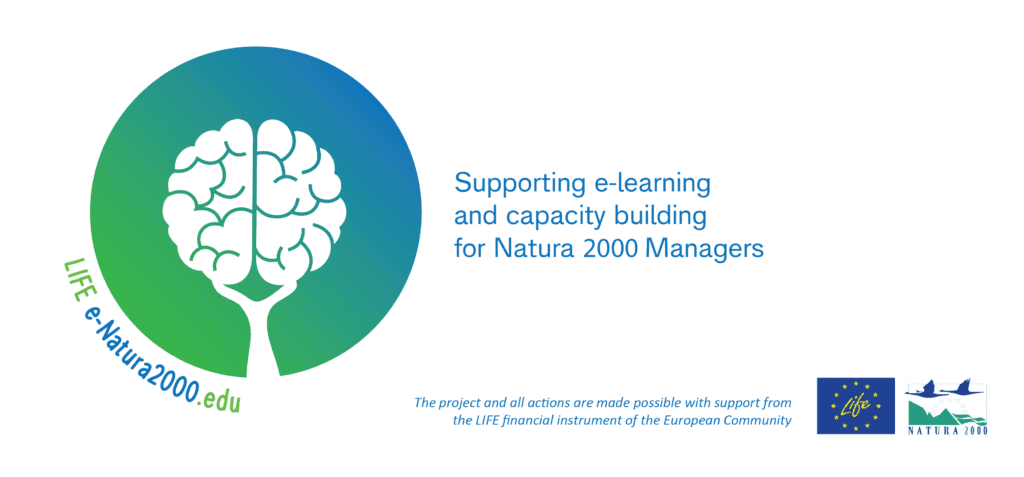
Previous Webinars
Information Sharing Event: Outdoor Sports in Protected Areas
On the 3rd of March, EUROPARC and ENOS organised an Information Sharing Event in Brussels, focused on the connection between nature conservation and outdoor sports. After the launch of the 10 Good Principles for Outdoor Sports in Protected Areas in 2019, this event was an opportunity to reinforce the connection between the sports and the nature sector, and to bring in the European Commission´s perspective.
Outdoor sports and nature conservation, drivers of a healthy, inclusive and sustainable society
The ”Outdoor sports and nature conservation, drivers of a healthy, inclusive and sustainable society” event was a fruitful discussion with multiple perspectives. Among the 40 participants from more than 10 countries, we could count on a wide range of stakeholders from different countries and nationalities. The lively debate was sustained by actors from different sectors, all connected to each other through Outdoor Sports in Protected Areas:
- Representatives from sports ministries and national governments
- Representatives of the European Institutions
- NGOs and representatives of sports organisations / federations
- Representatives of health organisations
- Private consultants and other professionals
The invited guests from the European Commission were Mr Nicola Notaro, Head of Nature Unit, DG ENV, Mr Yves Le Lostecque, Head of Sport Unit, DG EAC, and political assistants from Members of the European Parliament (MEPs) who will take the conclusions and recommendations to the European Parliament. They provided an interesting perspective on how the Green Deal could influence the real policies for outdoor recreation in protected areas.
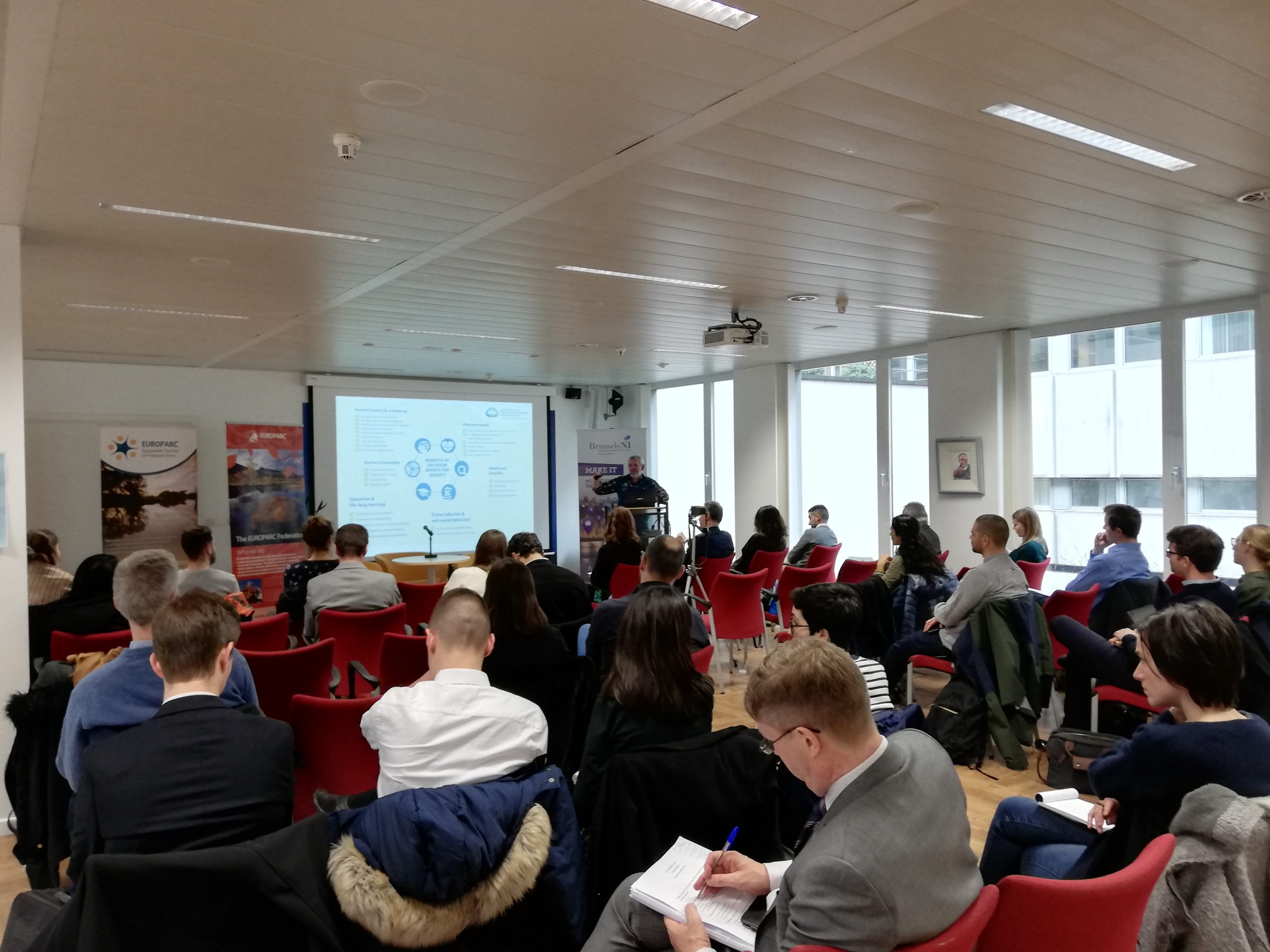
Audience. Office of the Northern Ireland Executive in Brussels, 2020. Photo: Stefania Petrosillo.
Some conclusions: Why is it important?
It is important to carry out transversal management plans that take into consideration the vision, objectives and solutions of all the actors involved in the life of the protected areas. In addition, an effective communication of the message will allow us to reduce the impact of our activities on biodiversity and the landscape in general. EUROPARC is developing a Toolkit to help you in implementing and achieving the mentioned objectives.
The event also led to draw some conclusions on the important points to be addressed in the coming years, both at the institutional-political level and at the local level by protected area managers and sports federations or clubs:
EUROPARC Federation:
- A holistic approach is needed, through networking and partnerships.
- Importance of having an influence in the policy makers and other sectors as the Sustainable Tourism Industry.
- Objective: innovative communication and management of Protected Areas.
- Connection with the programme ‘‘Healthy Parks, healthy people’’.
We all need nature. We want to have a positive impact and we want to make a change, but the hardest thing to change is people’s mind (Carol Ritchie)
ENOS:
- For outdoors sports as we use other peoples’ land, we want to make sure we do so in a responsible way.
- The Green Deal is a good starting point but no a static stone, it’s fluid, it can change.
Outdoor Sports cannot only be part of the problem, we need to be part of the solution (Michael McClure)
DG EAC, Yves Le Lostecque, Head of Sport Unit:
- The vision of sport has changed since 10 years ago: now at EU level, sport is also about social inclusion, education, physical activity, health, jobs creation, environment… some recommendations were already adopted in 2016 on sustainability.
- In the future, much more will be done on the field of green sports, because of the Green Deal. The Commissioner Mariya Gabriel is very interested in this topic and the discussion has already started: environmental concerns will be more and more taken into account.
- The new EU plan for sport is a golden opportunity for the environment to be integrated into the sport plan.
- ERASMUS+ is the main tool for projects related to the topic, which will have more budget in order to keep with the good work among the Member States.
We need to make sports, as other –human activitiy to be as green as possible (Yves Le Lostecque)
DG ENV, Nicola Notaro, Head of Nature Protection:
- The European Commission has already produced a Guidance document on the impact of tourism in PAs, but now can be a good moment to update and complete it.
- Important to take into account all types of protected areas, as periurban parks and green spaces for people living in urban areas, where is good to practise outdoor sports.
- Protecting nature and enabling activities such as Outdoor Sports will result in a benefit for the whole society, but tourism is both an opportunity and a pressure, so need to understand the elements of quantity and infrastructure pressure.
- There is also an opportunity on Outdoor Sports to reduce social inequality and fight for social inclusion.
- Important to align actions and initiatives with the EU 2030 Biodiversity Strategy.
- LIFE will remain the tool to develop projects in the field of nature conservation.
This is just the beginning of a dialogue between our two communities, so that we can identify a set of concrete actions (Nicola Notaro)
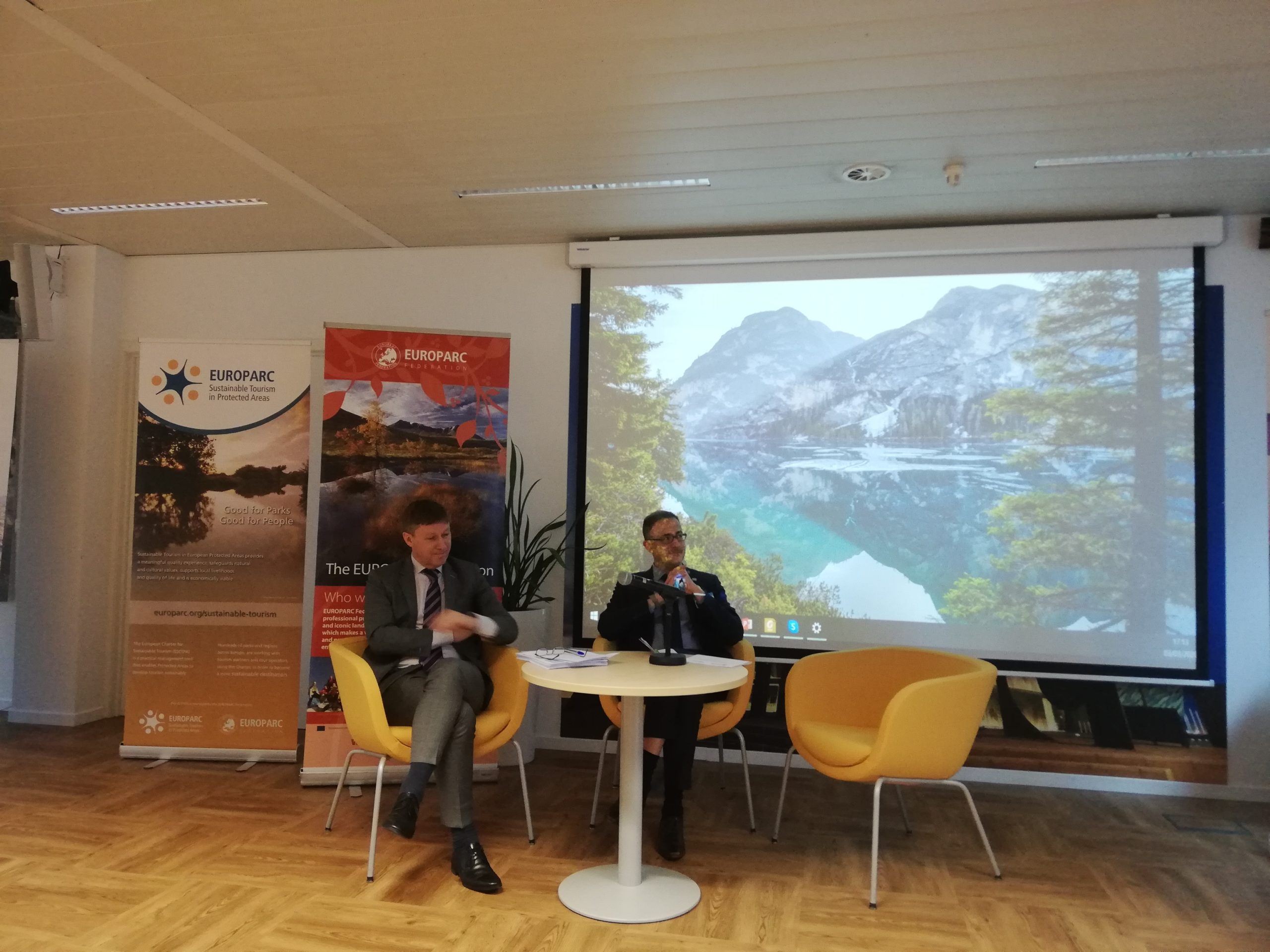
Yves Le Lostecque and Nicola Notaro. Office of the Northern Ireland Executive in Brussels, 2020. Photo: Stefania Petrosillo.
Did you miss it?
Do not worry, if for some reason you could not attend the event, in addition to the previous conclusions, you will find here the presentations made by EUROPARC and ENOS:
- Presentation PDF EUROPARC Federation, by Alberto Robles, Policy Assistant.
- Presentation PDF ENOS, by Mike McClure, Chairman.
More information at the Outdoor Sports Knowledge Hub.
During the next months, we will discuss possible initiatives and/or future projects together with our colleagues at ENOS in order to bring together the fields of environmental and sports education.
If you have any questions, suggestions, or would like to discuss a particular recommendation, do not forget that this is an open and multidisciplinary initiative, so we will be happy to hear about your vision; please contact us at: policy.assistant@europarc.org
We would like to say a big thank you to Sport Northern Ireland Executive Office for allowing us to host the event at their venue, as well as our colleagues at ENOS and all the participants of the event. Stay tuned for more information!
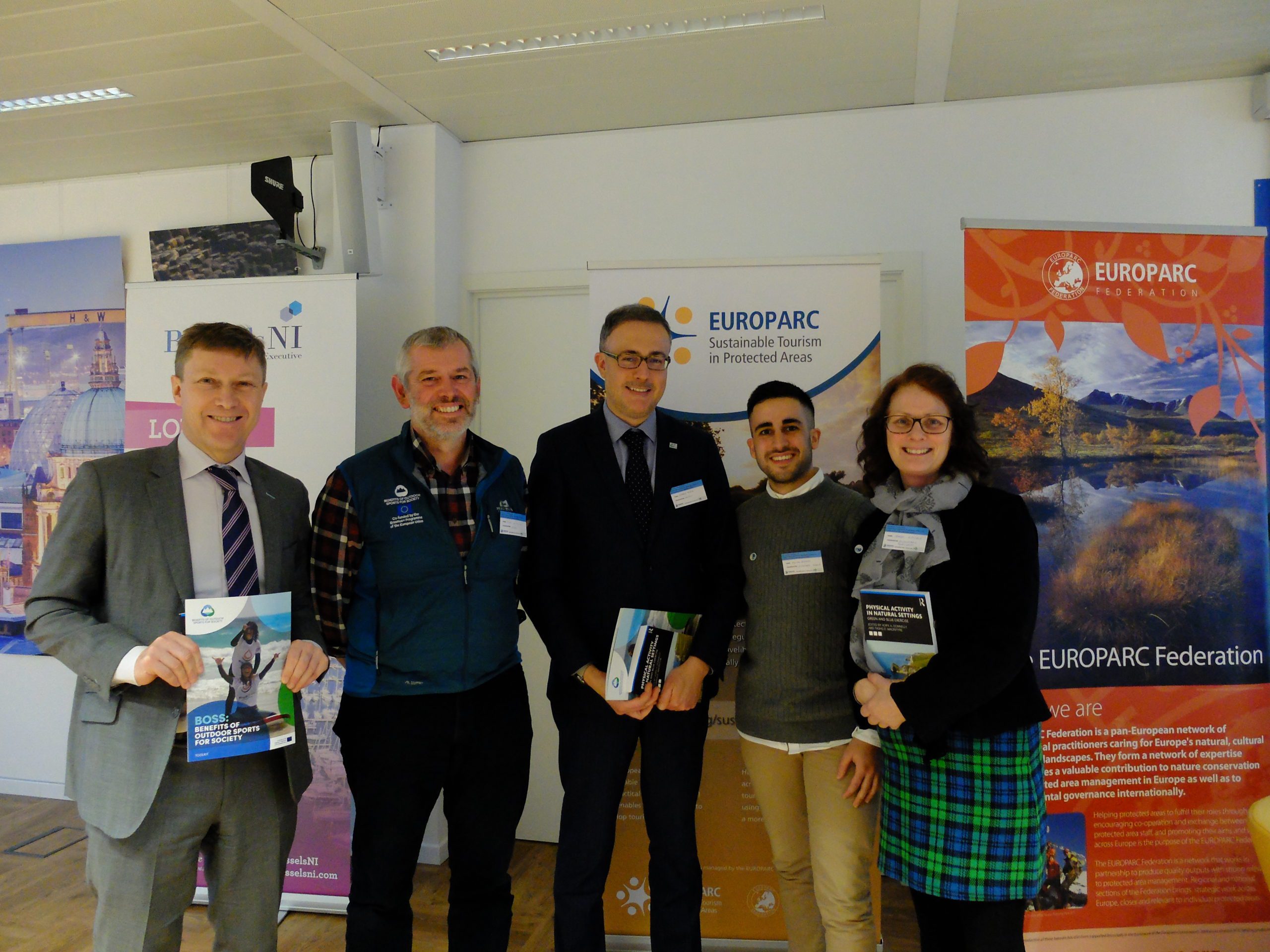
Yves Le Lostecque, Michael McClure, Nicola Notaro, Alberto Robles and Carol Ritchie. Office of the Northern Ireland Executive in Brussels, 2020. Photo: Stefania Petrosillo.
